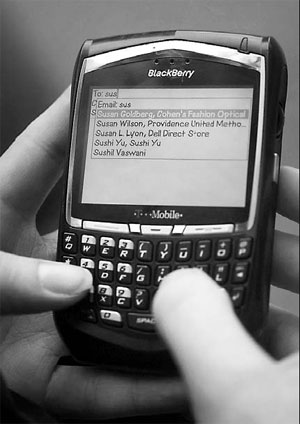

Should an employee get paid for reading a BlackBerry at the dinner table, sending an office e-mail or posting a job-related blog at home?
A spat at ABC News over paying writers who check their BlackBerries on their own time recently raised the issue, and such a dispute marks the leading edge of a deluge of unresolved and potentially heated cases to come in the United States, experts say. The growing technical ability to work remotely, combined with the growth of work-related legal disputes, is raising "lots of smaller-scope issues of this kind", says John Thompson, an expert in wage and hour law at Fisher & Phillips in Atlanta.
"We've never seen anything like it. Just the question of what is work and what isn't is a practically endless question," he says. "It is going to drive to the surface all kinds of issues that nobody's ever thought of before."
At ABC, under a longstanding contract waiver, writers who sporadically checked their BlackBerries after hours did not incur time-and-a-half overtime pay.

The union, the Writers Guild of America, East, challenged the waiver when three new writers were hired, and the company responded by taking away all writers' BlackBerries, ABC said.
The waiver was quickly reinstated, says Jeffrey Schneider, senior vice-president of ABC News.
"We're glad to be back to the status quo where people can still check their BlackBerries and stay read in without incurring time-and-a-half overtime, which turns very quickly into a very big bill for a news division like ours," he says.
"We absolutely want to compensate people for overtime that they work, but that does not cover simply checking your e-mail," he adds. "That would cover substantial work that gets done."
Simply checking a BlackBerry was not the union's concern, says Lowell Peterson, executive director of the Writers Guild, East. "Our folks are professionals. They're not going to start putting in overtime slips for 2.1 minutes.
"Our concern is we don't want this to grow into a major work commitment that people don't get paid for," he says.
The issue is not so much tapping out a brief message on a BlackBerry; it's the ability to write articles, post blogs, draft documents, research the Internet or sign contracts, all on a tiny, mobile, handheld gadget, experts say.
"Technology is going to continue to move in that direction," Peterson says. "It was important to us to make it clear that here's where we stand. This is not going to become an unpaid 24-7 workplace."
Unreasonable?
Productivity expert Laura Stack has little sympathy for the employee side of the argument.
"Show me one employee who doesn't waste time at work," the Colorado-based author says. "I see so much abuse of working hours by employees - personal phone calls, socializing, checking eBay listings, booking personal travel, etc - that I don't believe it's unreasonable for an employer to want a bit of work on personal hours.
"If you don't want to be on call, don't be a doctor, a computer technician, or a reporter," she adds.
As technology moves ahead, and the days when "having a pager was a great big deal" are gone, says Peterson, "We're going to have to trust people's common sense, on both sides."
Legal expert Thompson says many of the disputes could be decided on the basis of what in law is called "de minimis".
"What that means is, 'Is it too trivial for the law to mess with?'" he says.
Many cases, he says, arise when employees grow unhappy at work. "It's fine as long as everybody's happy," he says. "Once they cease being happy, they want to make an issue of it."
Agencies
(China Daily 06/30/2008 page11)













